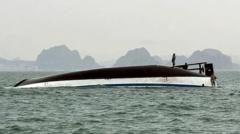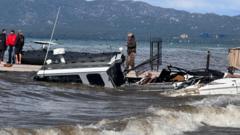Amid a severe storm, two Russian oil tankers have sunk in the Black Sea, with reports of oil leakage currently being addressed through rescue and environmental response efforts. The incident raises concerns over ecological impacts in the region.
Russian Tankers Capsize in Black Sea, Environmental Concerns Emerge

Russian Tankers Capsize in Black Sea, Environmental Concerns Emerge
Two Russian oil tankers sink due to severe weather, prompting urgent rescue and cleanup operations as oil leaks into the Black Sea.
Two Russian oil tankers have capsized in the Black Sea, prompting widespread concern over environmental impacts as oil leaks from the vessels. The incident occurred in the Kerch Strait, an area that geographically separates Russia from the crime-occupied territories, with the Russian authorities confirming that a total of 29 crew members were aboard the ships during the unfortunate event.
The Federal Sea and Inland Water Transport Agency, Rosmorrechflot, reported that the storm led to the sinking of the two vessels, identified as Volgoneft-212 and Volgoneft-239. Videos circulated on social media, which remain unverified by major news organizations like the BBC, depict one of the tankers reportedly breaking apart in the churning sea as streaks of oil become visible in the water.
In response to this environmental crisis, Russian authorities have initiated a rescue and cleanup effort, deploying two tugboats and two helicopters along with over 50 personnel to mitigate the damage. This rapid mobilization is crucial not only for rescuing the crew members but also for addressing the oil spill that poses a threat to local marine ecosystems.
The wreckage of the tankers has raised alarm regarding the potential ecological fallout. Oil spills are known to have devastating impacts on marine life, affecting everything from fish populations to the health of coastal habitats. The urgency of the current situation is underscored by the need for a dependable response to minimize long-term environmental damage.
As the cleanup operation intensifies, the incident highlights the vulnerabilities inherent in maritime operations, especially in adverse weather conditions. Observers and analysts will continue to monitor the situation closely, awaiting further updates on the status of the crew members and the effectiveness of the ongoing environmental response initiatives.






















